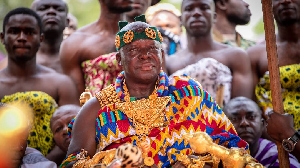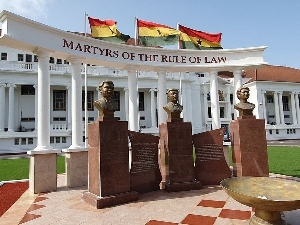Opinions of Friday, 19 May 2006
Columnist: Adu-Asare, Yaw
Kufuor Administration Falters
Fighting Executive Branch Corruption
This article discusses the dynamics of President John Agyekum Kufuor?s defensive stance about charges of worsening corruption in Ghana under his administrations (January 2001 to December 2004 and January 2005 to the present).In a previous article, it emerged that president Kufuor and leading officials of his administration tended to defend the overwhelming negative views about execution of the Administration?s promised policy of zero tolerance for corruption. President Kufuor and the officials have continued to point to pieces of legislation enacted during the closing months of the first Administration as evidence of fighting corruption.
>From the discussion below, it is clear that in defending the charge of weakness in execution of zero tolerance for corruption, Pres. Kufuor and his men fail or refuse to recognize that corrupt practices by personnel in some state institutions reflect negatively on their rule.
Entities such as the national police administration, Korle Bu Hospital, CEPS, Lands Commission, ministry of finance, among others, are public institutions under the jurisdiction of the national Administration, headed by the president, as chief executive officer. Thus, the Administration is liable for the corrupt actions of personnel in those institutions. Therefore, as long as significant indicators continue to point to the fact or perception, that corruption exists in certain public institutions of Ghana, the Kufuor administration cannot exculpate itself from accusations of inefficiency in fighting corruption in the country, with mere words.
?About 52 per cent of respondents perceived corruption as a common feature of the Ghanaian public administration, while 27 per cent see it as occurring only in isolated cases,? stated a GNA news story posted on ghanaweb.com on Tuesday, April 18, 2006, commenting on a report by African Peer Review Governing Council on Ghana.
In 2002 and 2003, audit reports of operations in the state-owned Ghana Airways and the leading public medical facility, Korle Bu Hospital in Accra, revealed massive financial mismanagement and fraud.
A survey report released by Ghana Center for Democratic Development (CDD) in 2003 showed also ??that most Ghanaians perceived corruption as a major problem within the Ghana Police Service.? Those negative audit reports, among others, gave credence to other findings that corruption had been rife in Ghana, preceding the Kufuor administration.
Throughout the first Kufuor administration, multinational corruption tracking institutions gave Ghana negative ranking, relative to other countries of the world and the Africa region. Transparency International (TI), the Geneva, Switzerland-based World Economic Forum and the Washington, DC-based Public Integrity, rated Ghana poorly in their annual reports on corruption.
Mr. Emile F. Short, Commissioner of Ghana?s Commission on Human Rights and Administrative Justice, CHRAJ, in 2002, characterized the zero tolerance for corruption slogan coined by Pres. Kufuor as an ideal that lacked focus and direction. ?The CHRAJ boss said for instance that failure by the government to fulfill key electoral promises that suggested a radical solution to the myth of corruption, has gone a long way to create skepticism in the minds of the public about the ability of the Kufuor administration to deal with Ghana?s number one enemy.?
On the positive side, Emile Short saw hopeful developments in Ghana?s struggle against widespread corruption from certain legislative actions such as a draft Freedom of Information Bill, Whistleblower Protection Bill, draft Procurement Bill and ? ?welcomed the establishment of the Office of Accountability.? Subsequently, CHRAJ created an Anti-Corruption Unit ?? to investigate and prosecute public office holders mentioned in the Auditor-General?s Report submitted to Parliament for embezzling state funds.?
The anti-corruption legislations that the CHRAJ Commissioner referenced above, received a lot of exposure in the Ghanaian press, however their full benefits did not materialize during the first Kufuor administration. Both the Freedom of Information Bill and the Whistleblower Protection Bill have not become Law as at the time of writing this article. In July 2003, Pres. Kufuor established formally a three-member Office of Accountability under the Office of the President.
In 2003, three public financial management reform bills introduced by the ministry of finance and economic planning received parliamentary assent to become Laws: Financial Administration Act 2003 (Act 654); Internal Audit Act 2003 (Act 658); and Public Procurement Act 2003 (Act 663). However, those three financial management Acts became operational in August 2004, that was only four months away from expiration of the first Kufuor administration.
In July 2004, a senior official of the ministry of finance said, ?? Act 654, which replaced the Financial Administration Decree, 1979 (SMCD 221) was necessitated by structural changes in government administration and the need to ensure open and efficient utilization of public finance.? He said, ?Act 658, on the other hand, sought to strengthen the internal control audit functions of MDAs, Metropolitan, Municipal and District Assemblies (MMDAs).? According to the senior official, ??Act 663 provided for a comprehensive and transparent legal and institutional framework to remedy the old system, which was fraught with weak capacity and inadequate procurement planning and procedures among other things.?
Commenting on Act 663 (Public Procurement Act) in 2004, a World Bank specialist in procurement told his audience that research indicated Ghana had the highest cost of road construction in the West Africa region ??due to lack of control and monitoring of contracts and procurements.?
The specialist indicated also that 8.5 trillion cedis out of 13 trillion cedis of Ghana?s budget for 2003 went into procurement. He made the point that proper controls, monitoring and competition in government procurement procedures everywhere in the world, resulted in potential lowering of prices and cost to the public. The World Bank official concluded that the existing procurement procedures of Ghana lacked accountability, transparency and efficiency; weaknesses that Act 663 was written to overcome.
Before and after establishment of the three-member Office of Accountability, some active Ghanaians expressed doubts about its efficacy. Referencing experiences with establishment of Office of Accountability in other African countries, a senior member of Ghana?s Institute of Economic Affairs (IEA) in late 2002, characterized the phenomenon as ?? a mere public relations unit and a complete waste of everybody?s time.? The IEA senior official expressed disdain for an Office of Accountability located in the office of the president. He said offenders would be off the hook because of lack of discipline among Ghanaians.
In place of an Office of Accountability located in the Office of the President, the IEA official suggested an ?independent? Office of Accountability to enforce strictly leadership code of conduct. He suggested also the establishment of a constitutionally mandated Office of Public Prosecutor ?independent of the Office of the Attorney General and not under the control of any political office holder.?
There was no evidence of a report of finding of corruption from the Office of Accountability during its 16 months existence, before expiration of the first Kufuor administration.
Three months into the Kufuor administration, a newspaper opinion piece suggested that some of its actions and inactions ? ? risked putting the president?s strong talk on corruption in jeopardy.? The editorial noted that Pres. Kufuor kept up his verbal crusade against corruption during the first months of his administration, yet only ministers and appointees of the previous government seemed to have fallen short of the president?s zero tolerance mark for corruption.
Negative opinions of Ghanaians about widespread corruption in society have not changed since the first Kufuor administration thereby belittling and ridiculing the idea of zero tolerance for corruption.
Before separating from CHRAJ, Emile Francis Short complained about the fact that in Ghana, the same individual held the joint position of the attorney general and minister of justice.
Mr. Short recommended separation of the two positions, ??because it was unrealistic to expect the attorney general, who was a member of the Executive, and a member of the ruling party to fearlessly prosecute public officers in the ruling party against whom recommendations had been made by anti-corruption bodies.?
-end-













